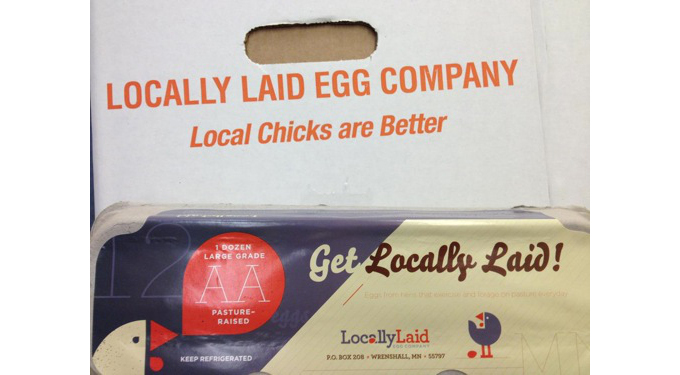Egg Company Locally Laid Turns Complaint Letter Into Lesson About Sustainable Agriculture
 Having received our fair share of complaint letters over the years, we know how tempting it can be to fire back at critics with negativity — but because that doesn’t solve anything, we’ve learned it’s always better to catch those flies with honey when possible. And in that vein, egg company Locally Laid took a shopper’s complaint about its high prices and sexual innuendos and turned the whole thing into a positive lesson about sustainable agriculture, while offering up an apology for causing offense.
Having received our fair share of complaint letters over the years, we know how tempting it can be to fire back at critics with negativity — but because that doesn’t solve anything, we’ve learned it’s always better to catch those flies with honey when possible. And in that vein, egg company Locally Laid took a shopper’s complaint about its high prices and sexual innuendos and turned the whole thing into a positive lesson about sustainable agriculture, while offering up an apology for causing offense.
We’ve written about the cheeky egg company in the past for its feat of pulling off sassy puns with style, so it’s no surprise that it’s now taking advantage of a disgruntled customer’s handwritten letter to explain not only its innuendos, but why its eggs cost more than others in the grocery aisle.
“I find your name on your egg carton extremely offensive and your sexual innuendos in advertising them vulgar,” he writes. “Not only were they the highest price in the store but also worst in advertising.”
He adds that he’s going to share his concerns with the grocery store and his friends, writing that there’s “enough crudeness in the world without egg advertising adding to it.”
Locally Laid replied in an open letter this week that should serve as an example to every other company faced with a displeased customer, taking the time to explain first of all, why those eggs are so pricey.
After acknowledging the customer’s right to complain and thanking him for taking the time to handwrite his letter, Locally Laid’s “marketing chick” Lucie Amundsen goes on to outline the company’s reasons for its name and prices.
She starts with the most basic reason it’s called Locally Laid — the pasture-raised eggs are indeed, “laid locally” — and goes on to explain why that matters in the grand scheme of things.
“The average food product in this country travels some 1,500 -2,000 miles from farmer to processor to distributor to your plate,” Amundsen writes. “That’s a lot of diesel burned and C02 pumped in the air. Our cartons travel a fraction of those miles. We’ve turned down lucrative contracts that would have taken our eggs out of the area because of our environmental stance.”
As for the price, which Locally Laid claims isn’t the highest priced brand out there, the eggs cost more because the company “practices sustainable agriculture, a sector that does not enjoy large government subsidizes like commodity products do,” the open letter explains.
“We move fences all spring, summer and fall, and fill waterers and feeders; it’s incredibly demanding work to get birds out of doors. And it all costs more,” Amundsen explains.
She then goes into great detail about the company’s efforts in “Middle Agriculture” and the state of farming in the U.S. today. Which, agree with all the information provided (and there’s a lot of it, in a long yet worthwhile read) or not, but explaining it all after a customer complaint is an admirable effort.
And yes, there’s some cheekiness involved in Locally Laid’s punning, Amundsen admits.
“And I truly am sorry, we offended you. (I’d offer you one of our American-made “Local Chicks are Better “ t-shirts, but I don’t think you’d wear it.),” she adds.
But it’s worth it, Amundsen explains, if it gives the company a chance to explain itself to consumers who notice its products because of that same cheekiness.
“With that second look from a consumer, we educate about animal welfare, eating local, Real Food and the economics of our broken food system,” Amundsen writes.
Again, whether you buy your eggs from the farm next door or the factory farm miles away, that’s not the point. We just like when a company could ignore or pass off a consumer complaint and chalk it up to a loss, it instead takes the time to lay it all out there. Pun intended.
*Thanks to Consumerist reader Amy for the tip!
Open Letter to the Man offended by Locally Laid [Locally Laid]
Want more consumer news? Visit our parent organization, Consumer Reports, for the latest on scams, recalls, and other consumer issues.

